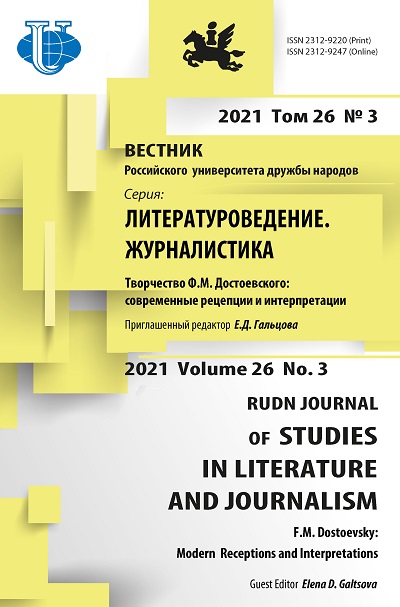Онтологические мотивы дома и бездомья в романе Ф.М. Достоевского «Бесы»
- Авторы: Кулиева Ш.А.1
-
Учреждения:
- Российский университет дружбы народов
- Выпуск: Том 26, № 3 (2021): ТВОРЧЕСТВО Ф.М. ДОСТОЕВСКОГО: СОВРЕМЕННЫЕ РЕЦЕПЦИИ И ИНТЕРПРЕТАЦИИ
- Страницы: 424-441
- Раздел: Литературоведение
- URL: https://journals.rudn.ru/literary-criticism/article/view/27644
- DOI: https://doi.org/10.22363/2312-9220-2021-26-3-424-441
- ID: 27644
Цитировать
Полный текст
Аннотация
Настоящая статья посвящена осмыслению мотивной пары «дом-без-домье» в романе Ф.М. Достоевского «Бесы». Достоевский реализует мотив дома в неразрывной антиномической связи с полярным ему мотивом бездомья, художественно воплощенном в идее бессемейности, бездомности, скитальничества, Хаоса, Энтропии. Актуальность исследования мотивов дома и бездомья состоит в том, чтобы поэтапно реконструировать авторскую концепцию «спасительного будущего» и приложить ее к современности. В настоящей статье мотивы дома-бездомья рассмотрены в нескольких аспектах, включая собственно топонимический, функциональный, архетипический и онтологический. Мы попытались продемонстрировать реализацию заявленных мотивов на уровне таких категорий, как вера-безверие, Рай и Ад, братство и обособленность. В романе «Бесы» последовательно развита идея о национальной почве и отрыве от нее, о возможном спасении человека и тех последствиях, которые ожидают общество в случае засилья «бесов» и утраты исконного «братства» - сокровенной связи между людьми. С этой точки зрения, мотивы дома и бездомья становятся для романного пространства ключевыми. В архетипике дома заложена идея о спасительном «своем» круге, которому противопоставлен внешний мир с его враждебностью, стихийностью, гибельностью. Все, что расположено за пределами этого круга, - элементы, принадлежащие антимиру, а потому их воздействие на микрокосмос дома губительно. Анализ текста подтверждает, что архетип дома у Достоевского дестабилизирован. Нарушается его герметичность; границы, защищающие внутреннее, оказываются проницаемыми. Мотив дома зачастую вытеснен мотивом бездомья, а потому закономерно рассматривать эту мотивную пару в ее антиномической неразрывности. В приведенном исследовании мотивы дома и бездомья рассматриваются как онтологические: они связаны с бытийным уровнем произведения, благодаря чему возможно установить онтологический статус актантов и определить соотношение с так называемой исходной идеей.
Ключевые слова
Об авторах
Шекер Авдыевна Кулиева
Российский университет дружбы народов
Автор, ответственный за переписку.
Email: shekkul@mail.ru
ORCID iD: 0000-0001-8682-0891
кандидат исторических наук, доцент кафедры иностранных языков факультета гуманитарных и социальных наук
Российская Федерация, 117198, Москва, ул. Миклухо-Маклая, д.10/2Список литературы
- Достоевский Ф.М. Бесы. М.: Издательские технологии, 2018. 716 с. URL: https:// books.google.ru/books?id=rQqcDwAAQBAJ&pg=PA46&lpg=PA46&dq (дата обращения: 10.07.2021).
- Иванов В. Достоевский и роман-трагедия. Собрание сочинений. Т. 4. Брюссель: Foyer oriental Chretien, 1987. 622 с.
- Орлова С.А. Мифо-фольклорный мотив дома в романе Ф.М. Достоевского «Бесы» // Вестник ЧелГУ. 2009. № 43. URL: https://cyberleninka.ru/article/n/mifo-folklornyy-motiv-doma-v-romane-f-m-dostoevskogo-besy (дата обращения: 27.05.2020).
- Ничипоров Б.В. Введение в христианскую психологию: размышления священника-психолога. М.: Школа-пресс, 1994. 188 с.
- Лосский Н.О. Бог и мировое зло. М.: Политиздат, 1991. 368 с.
- Ильин И.А. Собр. соч.: в 10 т. Т. 6. Кн. 3. М.: Русская Книга, 1999. 321 с.
- Касаткина Т.А. Взаимоотношения человека с природой в христианском миросозерцании Достоевского // XXI век глазами Достоевского: перспективы человечества: материалы Междунар. конф., состоявшейся в Университете Тиба (Япония) 22-25 августа 2000 г. М.: Грааль, 2002. 559 с.
- Сараскина Л.И. «Бесы»: роман-предупреждение. М.: Советский писатель, 1990. 480 с.
Дополнительные файлы















